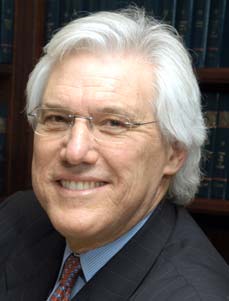Focus: Hedge Fund Services
The hedge funds industry is growing rapidly, attracting both new investors and companies looking to service this dynamic market.

As investments into hedge funds reach record levels of around $1 trillion worldwide, interest is growing in providing services to the rapidly expanding funds. Now, even investment banks are looking for a piece of the action, providing hedge funds with investment advice and offering their own hedge funds to investors, usually as funds of hedge funds.
Much of the new money flooding into hedge funds is coming from institutions, including public and private pension funds. US institutional investments into hedge funds total between $60 billion and $70 billion and will increase to at least $300 billion before they level off in five years or so, says Christopher J. Acito, principal at Casey, Quirk and Acito, a Darien, Connecticut- based management consultant to investment management firms.
Hedge fund investments by some endowments and foundations already have passed 40% of their assets, Acito says, and these investors may have reached their target allocations. But pensions and insurers have a much smaller proportion of their assets in hedge funds and will be increasing that percentage steadily in the years ahead, according to Acito. Institutions have discovered that returns that are not correlated with the broad market can tone down volatility in their portfolios, he says.
As institutional investors begin to appreciate the value of diversifying their portfolios with investments in vehicles that feature absolute-return strategies, mainstream fund-service providers have begun buying up specialist fund administrators to offer tailored services to hedge funds. The trend started in July 2002, when Boston-based State Street purchased International Fund Services, a provider of accounting and administration as well as tradesupport and middleoffice services. That same year, Bank of New York acquired International Fund Administration, a Bermuda-based alternative investment fund administrator.
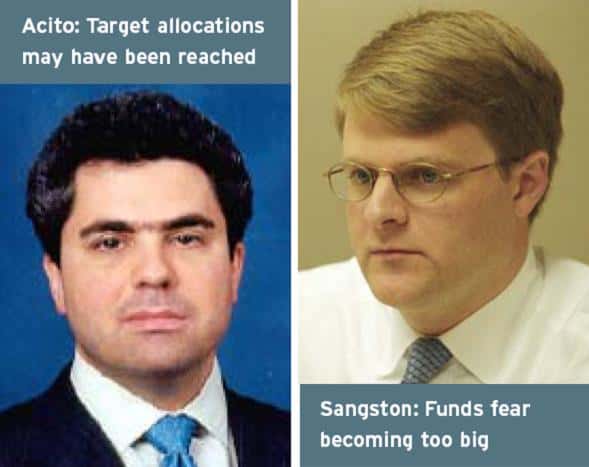
In addition to expanding its core servicing capabilities, State Streets strategy was to build its presence in alternative investments by leveraging its strengths in securities finance. Hedge funds were starting to appeal to Main Street, says Gary Enos, executive vice president and head of State Streets alternative investment services group.IFS was servicing $35 billion of hedge fund assets at the time, and we now have $100 billion being serviced, Enos says. There is no retail hedge fund yet, but we are hearing the drumbeat, he adds.
State Streets investment management arm, State Street Global Advisors, has approximately $700 million of hedge fund assets under management. It has created a dedicated Hedge Fund Strategies Group based in London to capitalize on the increasing market demand for alternative investments.
|
REGISTRATION OR REGULATION? | ||
|
Hedge fund advisers and managers face increasing scrutiny from government regulators as a result of the recent growth in hedge funds, due mainly to a flood of money from institutional investors. There already has been an increase in the number of hedge fund enforcement cases brought by the US Securities and Exchange Commission in the past few years. Meanwhile, state attorneys general are using state anti-fraud statutes to pursue enforcement actions against hedge funds. More and more hedge fund managers are registering voluntarily with the SEC under the Investment Advisers Act of 1940, says Michael G. Tannenbaum, founding partner of the New York-based law firm Tannenbaum Helpern Syracuse & Hirschtritt and head of the firms financial services, capital markets and hedge funds practice group. Nonetheless, hedge fund advisers often rely on the de minimus exemption from registration for advisers with 14 or fewer clients. Even advisers who do not register are subject to anti-fraud provisions of the US securities laws. An SEC staff report on hedge funds released on September 29, 2003, recommended that the commission consider revising its rules to require that hedge fund advisers register under the 1940 act. The report, which followed a lengthy factfinding investigation, said the SEC lacks information about hedge funds and their advisers activities at a time when there is the potential for increased investment by less-sophisticated investors. There is no need for the SEC to change its rules, says attorney Tannenbaum. Institutional investors are demanding that hedge fund advisers register or they will withhold their business, he says. The industry will take care of this themselves. If advisers do register, they become subject to regular inspections and examinations by the SEC, as well as disclosure and sales and promotion rules.
Consultants at Connecticut-based Greenwich Associates say they believe that hedge funds will come under greater regulatory scrutiny in the months ahead and that new regulations are likely in the US and the UK. Greenwich suggests that hedge fundsespecially those that are accepting or soliciting pension-fund capitalshould prepare for a tightening of oversight by strengthening risk controls, planning for expanded disclosure, and reviewing the way they compensate prime brokers for introducing them to potential investors. The flood of pension money has resulted in a proliferation of new hedge funds and has stoked competition among prime brokers for the profitable business generated by this booming industry sector, according to Greenwich. The availability of cheap credit from prime brokers is making it easier for hedge funds to increase their leverage, the firm concluded from a recent survey of 36 such funds in the Americas, the UK and Europe. Gordon Platt |
The Bank of New York acquired International Fund Administration in October 2002. The IFA acquisition, which closed in February 2003, gave us a client base, as well as technology and a management team, says Brian Ruane, executive vice president and hedge fund services manager at Bank of New York, which now has $38 billion of hedge fund assets under management. He says the bank has no plans to offer investment advice to hedge funds.
BNY Asset Management provides qualified clients with access to hedge funds through Ivy Asset Management, which The Bank of New York acquired in 2000. Ivy Asset creates funds of hedge funds tailored to meet the investment objectives of its clients.The firm uses 110 leading hedge funds worldwide in its fund-of-funds portfolios.
BNY Alternative Investment Services has a wider product offering than competing service providers, as well as proprietary technology, Ruane explains. We saw alternative investments as a growth area because of the growth of hedge funds as an asset class, as well as the fact that the existing institutional customer base was increasing, he says.
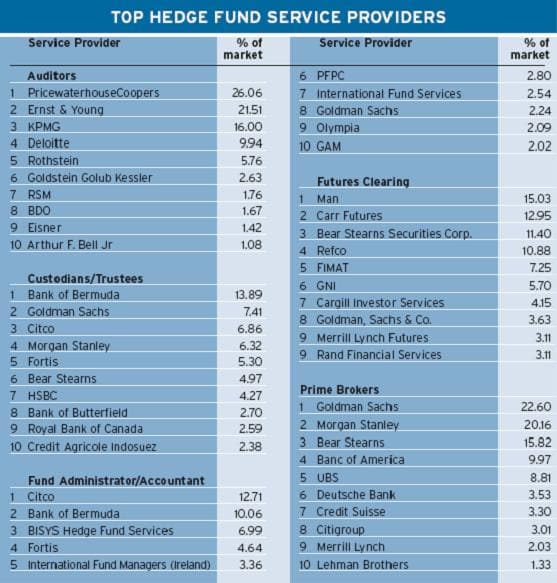
Potential for Regulation
|
FACTS BEHIND THE FIGURES |
|
Fairfield, Connecticut-based CogentHedge, which provided the league tables that appear with this article, is a leading data aggregator for the entire universe of alternative investments, excluding private equity and privately managed accounts. Our goal is to provide the most-comprehensive database of alternative strategy investments available to the hedge fund industry and qualified investors, says David Slavin, principal and a founding partner. CogentHedge includes data on more than 3,200 funds, plus several hundred more that are hidden from general view but accessible to individual users identified by investment managers that dont want to appear in a public forum. Non-US managers run half of the participating funds. The database includes more than 1,200 registered managers. Our core clientele are research analysts and investment officers at large institutions, Slavin says. They are offered free access to a broad assortment of tools and an unbiased analytical environment that allows them to look for specific entities. Any alternative investment strategy may be profiled, analyzed and compared with any other strategy in the CogentHedge database. Institutions use us as a back-office information provider to keep tabs on their investments, says Slavin. For a fee of $5,000 a year, users also can download the database, which is updated daily, to run optimization scenarios. To be included, we require that the fund identify key service providers, Slavin says. GP |
Jeff Bieselin, senior vice president at The Bank of New York, says it is unclear at this point whether the hedge funds industry will come under increasing regulation. Service providers like us are positioned to benefit if there is Many investment banks see prime brokerage as a gateway to a full range of products and services offered by their firm to hedge fund clients. Demand for prime brokerage services has been growing as the number of potential hedge fund clients soars and individual funds use more prime brokers, according to a study by Connecticut-based Greenwich Associates. Nearly 30% of the 36 hedge funds in the Greenwich survey, which was conducted in March 2004, said that they have increased the number of prime brokers used in the past 12 months, and a similar percentage plan to add to their prime-brokerage rosters in the next year.regulation, he says. It wont be negative for our business.We can help firms adhere to compliance, he adds. Through its offshore fund service center subsidiaries in Ireland, Luxembourg, the Cayman Islands and the Channel Islands, Bank of New York is licensed to provide fund administration services including global custody, portfolio and company administration and transfer agency services.
There are three main reasons why hedge funds use multiple prime brokers, says Richard P. Del Bello, managing director and head of equity finance, the Americas, at UBS Investment Bank in New York.First, the funds want to have the ability to do additional stock borrowing, Del Bello says. Second, they want to do benchmark pricing to see how much they are being charged by different brokers. And third, they want to have access to additional capitalintroduction services, he says.
UBS does not charge for capitalintroduction, which Del Bello characterizes as a dating service. We dont even check to see how it works out, he says. These services are designed to introduce hedge-fund advisers to potential hedge-fund investors.
Popularity Rises, Performance Falls
A problem for some hedge funds is that there is too much money seeking to be invested, Del Bello says. If the fund becomes too big, it is more difficult to attain the desired rate of return, he says.
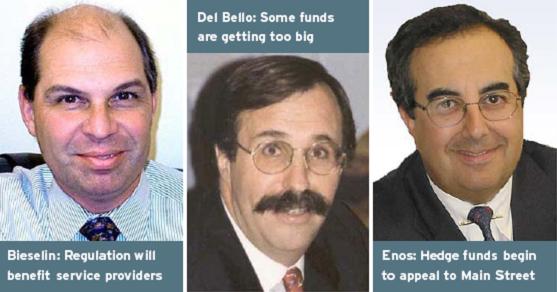
One strategy that works better in a small format is Pipes, or private investment in public entities, says Richard M.F. Ernesti, director and global head of alternative investments at Citigroup Global Transactions Services. Pipes involve investments by a private equity fund in a publicly traded company, usually at a discount. Public companies use Pipes to raise capital quickly for expansion and to avoid the expense of a public offering.
As long as hedge funds deliver returns that exceed those in other investments, the industry will continue to grow, Ernesti says. In recent quarters, however, hedge fund returns have been flat to negative on average, and some are beginning to wonder if the hedge funds managers are losing their touch.Industry participants are very bullish about growth, Ernesti says. The question is whether the industry can support the growth.
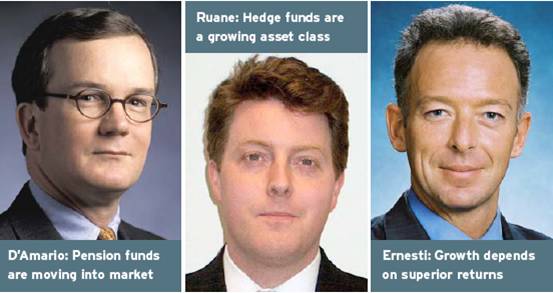
As hedge funds have caught on in Europe and Asia, prime brokers have introduced global platforms to service the business. Citigroup purchased Forum Financial in November 2003 to serve fund managers worldwide. The acquisition included operations in Portland, Maine, as well as in Poland and Bermuda. Citigroup is also planning to extend the availability of hedge fund investment techniques to a retail audience. We are working on a registered hedge fund that would be available to the retail market with a minimum investment of about $25,000, Ernesti says.
Proliferation Affects Investor Profile
Additional inflows of hundreds of billions of dollars would strain the capacity of the hedge fund industry, even in light of recent fund proliferation, say the consultants at Greenwich Associates.
In many cases, hedge funds dont have to solicit business today; they can market by picking up the phone when it rings, says Greenwich Associates consultant Tim Sangston.Some well-established hedge funds are turning people away for fear of becoming too big and losing the ability to chase opportunities for fear of moving markets, he says.
Pension funds of corporate and public workers are now moving money into the market, says Peter B. DAmario, another consultant at Greenwich Associates. Right or wrong from an investments point of view, theres a degree of political sensitivity arising because they are investing pension-fund assets, DAmario says. Theres a growing perception that the money flowing into hedge funds today is not just coming from wealthy individuals and endowments who can absorb a hit if things go awry, he says.
GORDON PLATT
